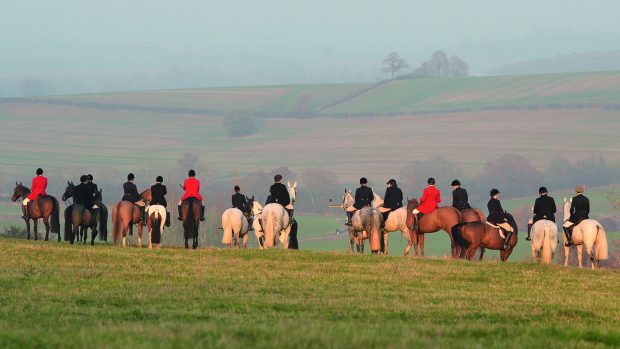“Puppy walkers are a crucial element of any pack of hounds,” says Berwickshire joint-master and huntsman Rory Innes.
“Going out to walk acts as a puppy’s primary school years — it is where they become socialised.”
Patrick Martin, huntsman of the Bicester with Whaddon Chase, says: “Probably the most rewarding part of walking puppies is seeing those you have cared for grow up and develop into members of the pack.
“They remember their walkers and are delighted to see them at meets, and it is a wonderful way of feeling part of the great tradition of hunting.”
“These are not just a pack of dogs; they have been carefully bred for hundreds of years, and walking puppies gives people a real interest in the pack and puts a completely different perspective on hunting,” adds Patrick.
Hound puppies are born anywhere between Christmas and the summer. They leave kennels to go out to their walkers at nine or 10 weeks, after their second set of vaccinations.
“They return to kennels when they have exhausted their welcome,” says Patrick. “And when their noses find their brains and that hereditary hunting instinct kicks in.”
This is a flexible length of time, but generally walkers keep their puppies for five or six months.
During that time, it is the walker’s responsibility to feed, exercise and educate them.
“It’s great if they can be introduced to as many situations as possible — livestock, other dogs and people. If they can become accustomed to walking on a collar and lead, it helps enormously,” says Rory.
They do need plenty of exercise, but this can take the form of walks a couple of times a day or general freedom during the daytime.
“Hounds are very adaptable. You don’t need hundreds of acres at your disposal to walk a puppy,” says Patrick.
“Yes, they will steal anything they can steal and dig up anything they can dig, but that’s part of the fun of it.”
Hounds are affectionate, social creatures who provide their walkers with great fun and entertainment.
“Children love them and they love playing with children,” says Rory.
Different kennels have different feeding regimes, so take advice from your own huntsman about food.
Most walkers take on one or two puppies — two is often best as they can entertain each other, but equally two will be more destructive than one.
Most importantly, enjoy them. You are playing a vital part in the lives of the single most significant and historic element of any hunt: the hounds.
It’s a privilege — even if it doesn’t feel like it when they have dug up your tulips and eaten your slippers.
Read all the latest hunting news
This article was first published in the 8 May issue of Horse & Hound magazine




